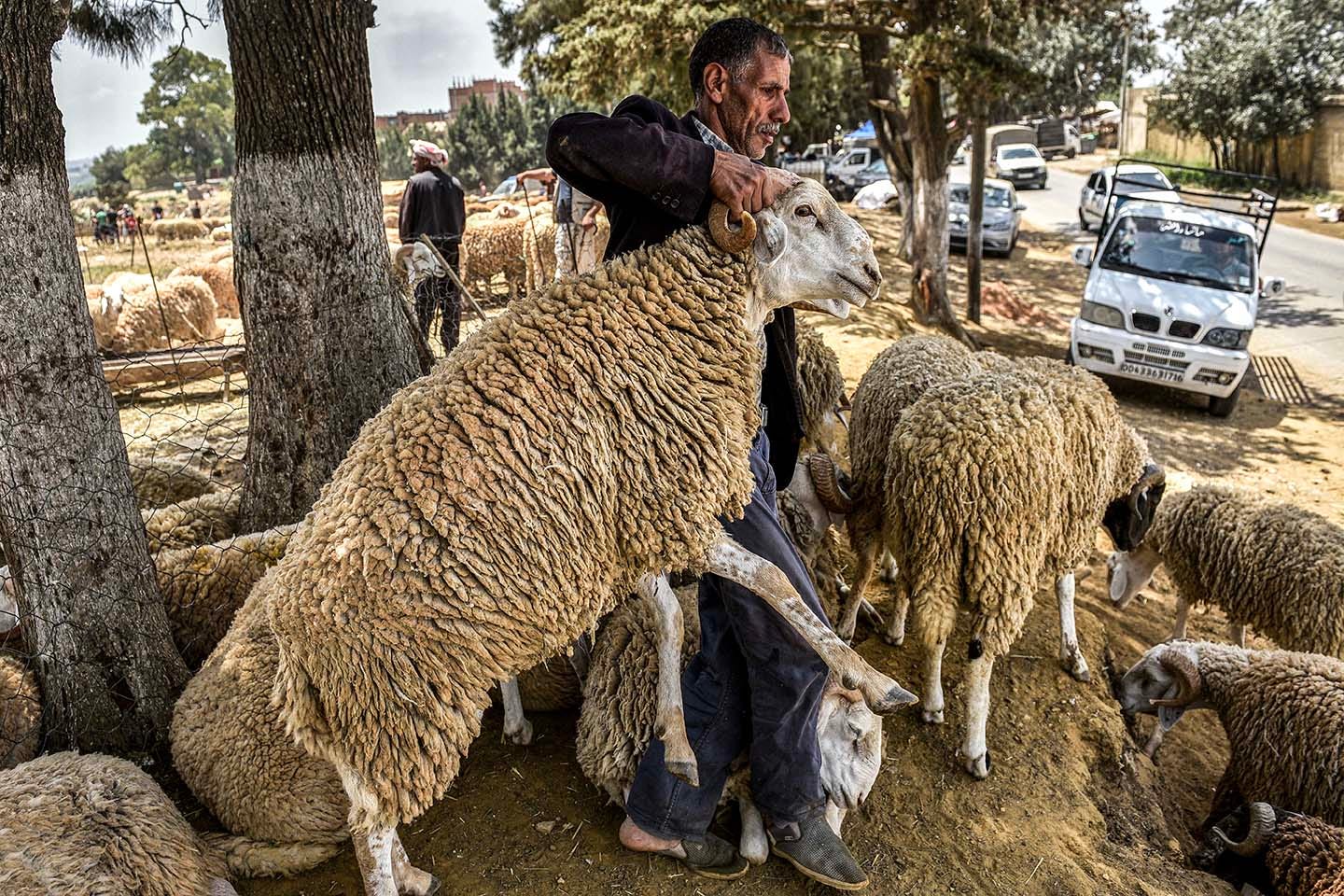This Eid, Algeria is short on sheep to share
Years of drought have decimated Algeria’s sheep population. Now, the country is having to rethink one of its most cherished religious traditions.
Madjid Serrah in Algiers
At a dusty livestock outlet in Baba Ali, on the edge of Algiers, a group of men sit cross-legged beneath tall eucalyptus trees. They aren’t protesting, nor escaping the midday sun. They’re waiting for sheep.
“There’s nothing here,” one man says with a chuckle. “But the air is nice, and we brought tuna and bread. Might as well make a picnic of it.”
The men had been told that a shipment of imported rams would arrive overnight – part of Algeria’s surprise solution to a nationwide shortage of sacrificial animals ahead of Eid al-Adha, the Muslim festival. But by midday the following day, not a single sheep had shown up. Staff shrugged. No one knew when – or if – they would arrive.
This year, Algeria has imported a million sheep from Spain and Romania. It is the first time the government has had to import livestock on such a dramatic scale, thanks to the nationwide sheep shortage.
This has been caused by a perfect storm of high feed prices, a shrinking national herd and years of punishing drought. A hotter world means more extremes of this kind of weather.
By importing sheep from Europe, the government intended to make Eid affordable for struggling families – but the plan has exposed deeper cracks in the country’s agricultural resilience.
Eid al-Adha, or Eid el-Kebir as it’s known locally, is a sacred occasion when Muslim families – who make up a sweeping majority in Algeria – traditionally slaughter a sheep to commemorate Prophet Ibrahim’s willingness to sacrifice his only son when God asked. But for many this year, the ritual has become a luxury.
The imports are being sold at around 40,000 dinars (US$300), while local sheep now go for between 85,000 and 160,000 dinars. But supplies are limited, and chaos has followed.
‘This isn’t Eid’
Across the country, at more than 800 designated outlets, queues stretch long into the day. In some places, customers have waited hours only to walk away empty-handed. In others, buyers allege that bribes were demanded for access to the healthiest animals, or that better rams were reserved for “special lists” In Oran, parliamentarian Kada Nejadi condemned what he called “widespread irregularities”, claiming that some employees sold access slips for up to 5,000 dinars. “We’ve received numerous complaints,” he wrote in a Facebook post, “and the system is being manipulated by those with no conscience.
To avoid a stampede, some municipalities have launched public lotteries. In one small town, just four imported rams were available — for a population of 4,000. Winners were announced via Facebook. In another, 130 sheep were raffled to over 600 residents. Authorities recorded the draws and posted the videos online. The spectacle sparked online mockery and memes, but also frustration.

“This isn’t Eid,” one man muttered as he turned away from a livestock centre. “It’s bingo.”
A few blocks away, a private seller offered locally bred sheep, some weighing more than 100kg – for triple the government’s price. Asked why, he was blunt: “Feed is expensive. You want big sheep, you pay big money.”
Then he turned to a customer who looked more serious.
Those who expressed disdain refused to share their names for fear of reprisal from the authorities.
‘Temporary fix’
The state’s move to import rams has been championed by pro-government media. The national news agency described it as “a major decision in favour of citizens’ purchasing power”. One newspaper even called it “a step toward dignity and food security”. Shipments of sheep arriving in ports like Annaba and Oran have been broadcast on evening news bulletins like state visits.
But beneath the headlines, the system appears overstretched – and Algerians know it.
“In theory, this plan helps the poor,” said Yazid Belkalem, head of the agriculture committee in the provincial council of Tizi-Ouzou. “But in practice, it’s just a temporary fix. We need deeper structural reforms – investment in local feed, livestock subsidies, and support for small-scale herders.”
He added: “We should also be looking at direct support to workers, like one-off cash grants for Eid. That would have a more immediate and lasting impact.”
Neighbouring Morocco, facing similar drought-driven livestock shortages, took a different approach. In February, King Mohammed VI made an unprecedented announcement: he called off the traditional Eid sacrifice for this year. The royal palace said the decision was made in solidarity with struggling citizens — and to preserve the nation’s livestock.
In Algeria, by contrast, the government chose to preserve the ritual, importing the sheep to keep it going.
Back at the sales point in Baba Ali, the atmosphere had turned quiet. The crowd had thinned. A few men lay on plastic mats in the shade, waiting for sheep that may or may not arrive.
“No one wants to skip Eid,” one man said. “But these days, it’s starting to feel like Eid is skipping us.




